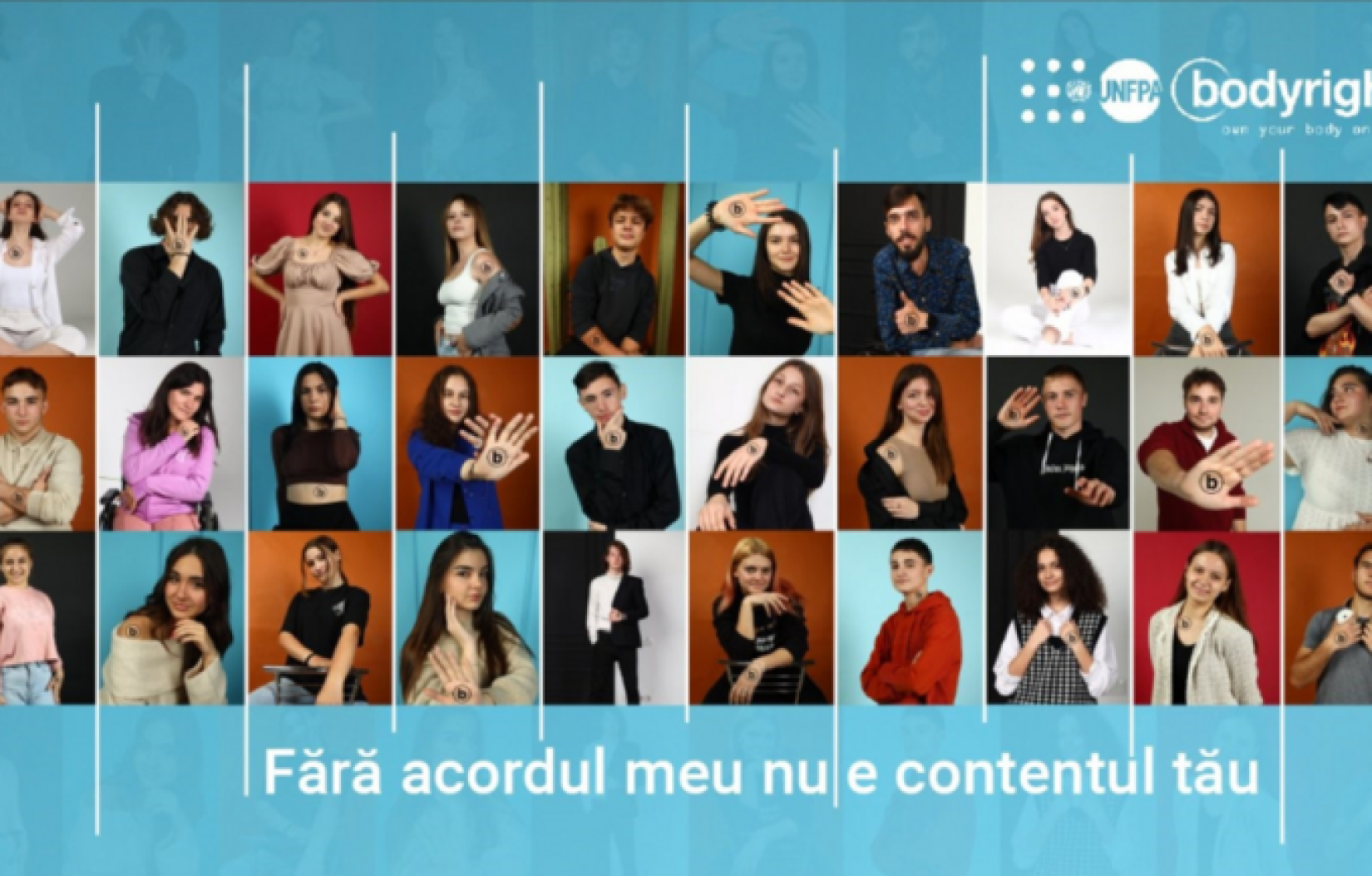Virtual flashmob on the International Day of Nonviolence in Schools: young people say "NO" to digital violence
31 January 2024
- A group of teenagers and young people, aged between 13 and 31, from various localities across the country – volunteers from Youth Centers, the Peer-to-Peer Educators Network in technical and vocational education, and the UN Adolescents and Youth Advisory Panel in Moldova, mobilized and organized a virtual flash mob, marking the International Day of Non-Violence in Schools.

In order to draw attention to the importance of protecting rights in the online environment, they collectively said "NO!" to digital violence.
"Being active online, I frequently encounter cases of digital violence on social media. It's important to know how to react in such situations. Sometimes, ignoring negative messages can be a solution. However, in more serious cases, I believe filing a complaint with the police and blocking the person is necessary. Talk to your parents or friends. Silence is not the solution," mentioned Nicoleta Reaboi, a student at "Vasile Coroban" High School in Glodeni town and a volunteer at the Youth Center in the same locality.
"I have never been exposed to digital violence. To avoid such situations, I carefully analyze before following someone and avoid engaging in dialogues with unknown individuals. If it ever happens to me, I intend to ignore and block that person," said Vlad Beșicuța, a student at the Ustia Gymnasium (Dubăsari) and a volunteer at the Ustia Youth Center.
"Some time ago, I was harassed online. I was verbally abused and asked for sexually explicit photos. I didn't have the courage to talk to anyone about it or seek advice, because fear and shame prevented me from taking action. If I were to go through the same situation today, I would report this incident to the police. It is important to recognize online violence and know how to react in such cases. Education is essential to protect ourselves," suggests Sandra Capșa, a student at I.P. Lucașeuca Gymnasium and a volunteer at the Youth Center in Orhei.
"I haven't experienced violence on social media. However, I am cautious and always mindful of what I post. To avoid any unpleasant situation, I communicate less with unknown individuals," reiterated David Nicolăiță, a student at the Vocational School in Leova town and a volunteer at the local Youth Center.
More than just a virtual event, this initiative marks the beginning of a series of awareness events about digital violence scheduled to take place in February and March in several cities across the Republic of Moldova. This is part of the #Bodyright campaign launched by the United Nations Population Fund (UNFPA) and other partners in November 2023. The events will be organized in the form of games/quizzes, providing young people with the opportunity to interact with various experts in the field. Teenagers will also meet with the singer Dara, who dedicated a song titled "Neiubire Virtuală" ("Virtual Unlove") to the topic of digital violence, and the online content creator Cătălin Lungu. They will provide essential information about the risks associated with the online environment and answer participants' questions.
According to UNFPA, online violence or technology-facilitated gender-based violence is a widespread phenomenon that takes various forms, including online harassment, hate speech, doxxing (publishing someone's personal and confidential information on the internet with the intent to intimidate), the non-consensual use and distribution of sexually explicit images in the online environment, and others.
This type of violence can, at some point, affect all individuals who use information technologies and social networks, but certain groups are more exposed to this risk. This is especially relatable for teenagers and young people who spend a significant amount of time online, as well as women activists, journalists, and politicians who often become targets of these attacks.
A study conducted by the International Center "La Strada" in the Republic of Moldova in 2021 showed that every second adolescent aged up to 17 in Moldova has been a victim of online abuse. The youth reported being asked for sexually explicit images online.
The #bodyright campaign - a movement against online violence - emphasizes the importance of raising awareness about the phenomenon of digital violence. In an era where young people are increasingly exposed to online risks, education and open dialogue become our essential tools. Through such initiatives, we aim to create a safe and informative space for teenagers, supporting them to navigate responsibly in the digital world and defend their rights.
If you or someone you know is facing digital violence, call the emergency service 112 or the helpline at 080088008.
Support the #bodyright movement in Moldova and take a stand against online violence. Protect your body images by applying the "b" symbol to photos posted on social networks. Only together we can stop violence and create a safer online environment for everyone.





